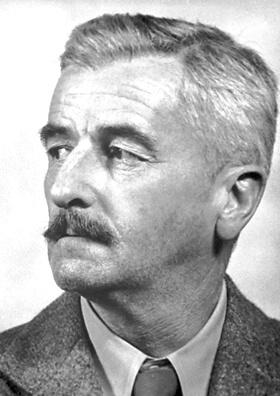
William Faulkner (1897 - 1962) is an iconic figure in American literature, particularly in the genre of Southern Gothic literature. Highly influenced by the black nanny who raised him, Callie Barr, and his mother and grandmother's encouragement of his visual imagination, his novels usually explored the politics of sexuality and race. In addition to the 1949 Nobel Prize in Literature, he also won the Pulitzer Prize for Fiction twice; in 1955 and again in 1963. He was friends with the short story author, Sherwood Anderson, who embraced naturalism and was known as a "writer's writer." He encouraged Faulkner to submit his first book manuscript that got published in 1926, titled Soldiers' Pay.
William Cuthbert Falkner (who changed the spelling of his surname in 1918) hailed from Lafayette County in north-central Mississippi and spent most of his life there. Starting in the seventh grade, he studied the history of Mississippi on his own time, rather than complete his school work, had to repeat grades, and never finished high school. Faulkner was surrounded by stories, hearing his elders' account of the Civil War, slavery, the Ku Klux Klan, and his family history, spawning his interest in writing.In addition to novels, plays, and short stories, Faulkner also wrote essays, poetry and screenplays. His work had a definite regional focus and flavor, conjuring Yoknapatawpha County -- a fictional county based upon Lafayette County -- as the setting for most of his work including; The Sound and the Fury (1929), As I Lay Dying (1930), A Rose for Emily (1930), Light in August (1932), and Absalom, Absalom! (1936). As I Lay Dying draws from Homer's The Odyssey, Chapter XI: "As I lay dying, the woman with the dog's eyes would not close my eyes as I descended into Hades."
Faulkner dated Estelle Oldham in high school and aspired to marry her, believing that he would. Estelle, however, dated other boys and when Cornell Franklin, a young man from a well-placed family proposed, her parents insisted that she accept. When that marriage dissolved in April 1929, Faulkner wasted no time and he and Estelle were married in June of 1929.
We look forward to featuring more of Faulkner's work when it enters the public domain.












